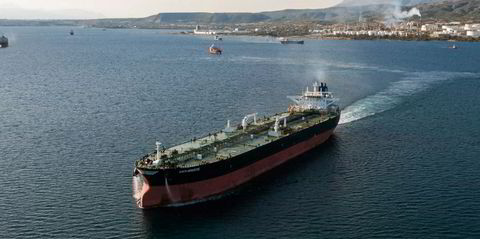Niels Stolberg had already paid a heavy price for his role in the downfall of Germany’s Beluga Shipping before he was jailed last week for three-and-a-half years.
His life’s work and reputation have been destroyed, and his health has suffered — he was diagnosed with stomach cancer in 2017. As if that were not enough, he has been personally bankrupt for the past six years.
On the penultimate day of his mammoth fraud trial, the former chief executive made an emotional confession. “I made mistakes. I deeply regret it,” he told the district court of Bremen. “I lost everything.”
It was heart-wrenching stuff, but it was clearly not enough to move the judge. The 57-year-old had been seeking a suspended sentence but what he had done “was just too much for that”, judge Monika Schafer declared.
On 15 March, she delivered a damning verdict, jailing the former high-flyer after he was convicted on numerous charges of accounting and credit fraud.
There is a chance Stolberg could avoid jail by appealing to the Federal Court, but that appears a long shot for the man who, for the best part of a decade, was Germany’s fastest-rising shipping star.
Those who knew Stolberg before his fall from grace describe him as a man full of ideas, full of energy. In their view, he simply rose too far, too fast.
But, last week, the only opinion that mattered was that of the judge, who referred to the “substantial amount of criminal energy” that Stolberg had displayed in deceiving banks. Therefore, she said a suspended sentence of up to two years was out of the question.
That jarring blow was delivered to a man who, for many years, was lauded in his local community as “businessman of the year”, as well as for his involvement in environmental and social projects.
In happier times, Stolberg had sponsored the Beluga School for Life, set up in Thailand after the 2004 Indian Ocean earthquake and tsunami.
He had helped Stephan Wrage’s SkySails put wind power firmly on the agenda well before the current oil price focused everyone’s minds.
He was also a sponsor and supervisory board member of the Werder Bremen football club.
All that was a result of the success of Bremen-based Beluga Shipping, which he established in 1995 in the heyday of the shipping boom. In 15 years, he grew Beluga into one of the world’s largest heavylift and multipurpose operators, with a fleet of 70 ships.
Few believe Stolberg could do it in today’s depressed shipping markets. But, back then, it was different. Banks such as Bremer Landesbank, now part of Nord/LB, and Commerzbank were falling over themselves to lend millions to the fledgling company.
That worked well for Stolberg, whom state prosecutor Silke Noltensmeier described as “blinded by ambition”.
Stolberg allegedly overstated the price of newbuildings to obtain higher loans from banks, specifically relating to 20 newbuildings ordered after 2006. The amount under dispute was around €93m ($115m today).
The arrival of a new investor, Oaktree Capital Management, led to the whistle being blown in March 2011 — and Beluga filed for bankruptcy on 16 March that year.
Prosecutors subsequently spent nearly four years building a case ahead of the hearing, which began in January 2016. It turned out to be one of the biggest maritime fraud cases the German courts had heard.
Since then, things appear to have gone from bad to worse for Stolberg. Today, the former multimillionaire is living off €1,800 per month, with the rest of his income going to creditors according to the regional newspaper Weser Kurier. It cited prosecutors’ claims that creditors are owed an astonishing €2.2bn.
Stolberg engenders mixed feelings among rival heavylift operators. “It’s a pity that someone who achieved such great things is subject to such bad karma,” one operator said.
Neither Stolberg nor his lawyer, Bernd Gross of Frankfurt firm Feigen Graf, could be reached in the wake of the verdict.
But those seeking to learn more about Stolberg’s side of things may not have to wait long. He looks set to tell his story in his own words and co-author a book — “Unsinkbar” (Unsinkable) — charting his rise and fall at Beluga, which will be published in the summer.





